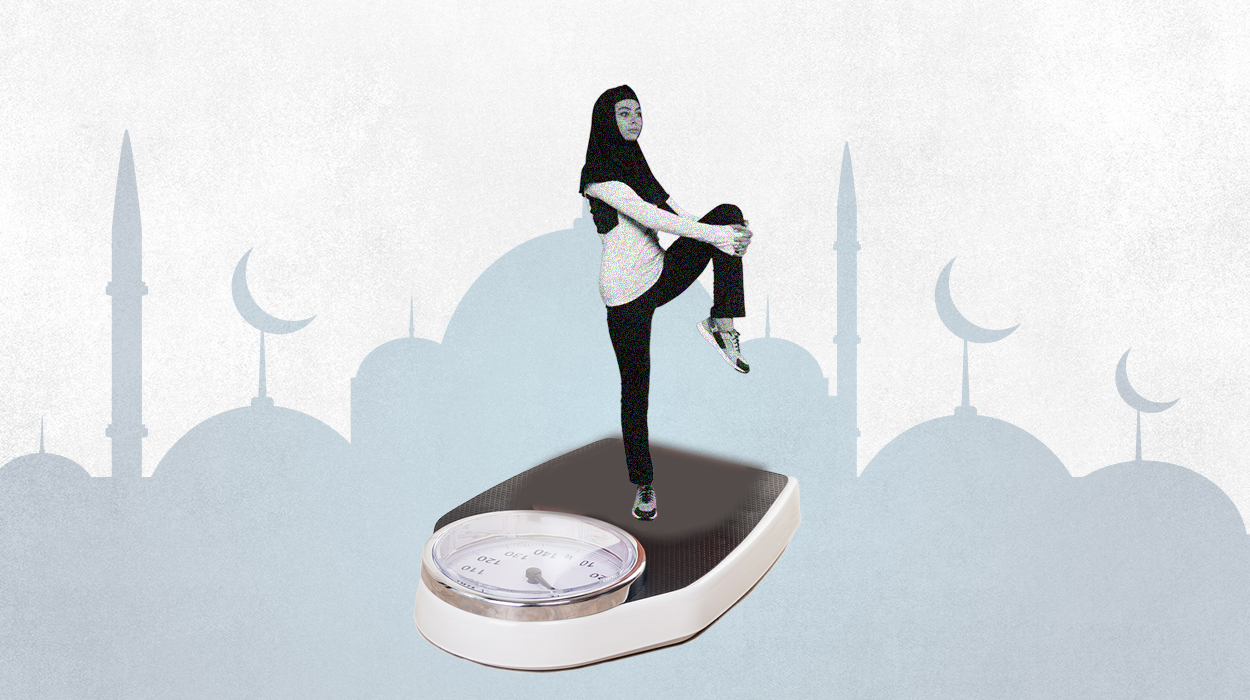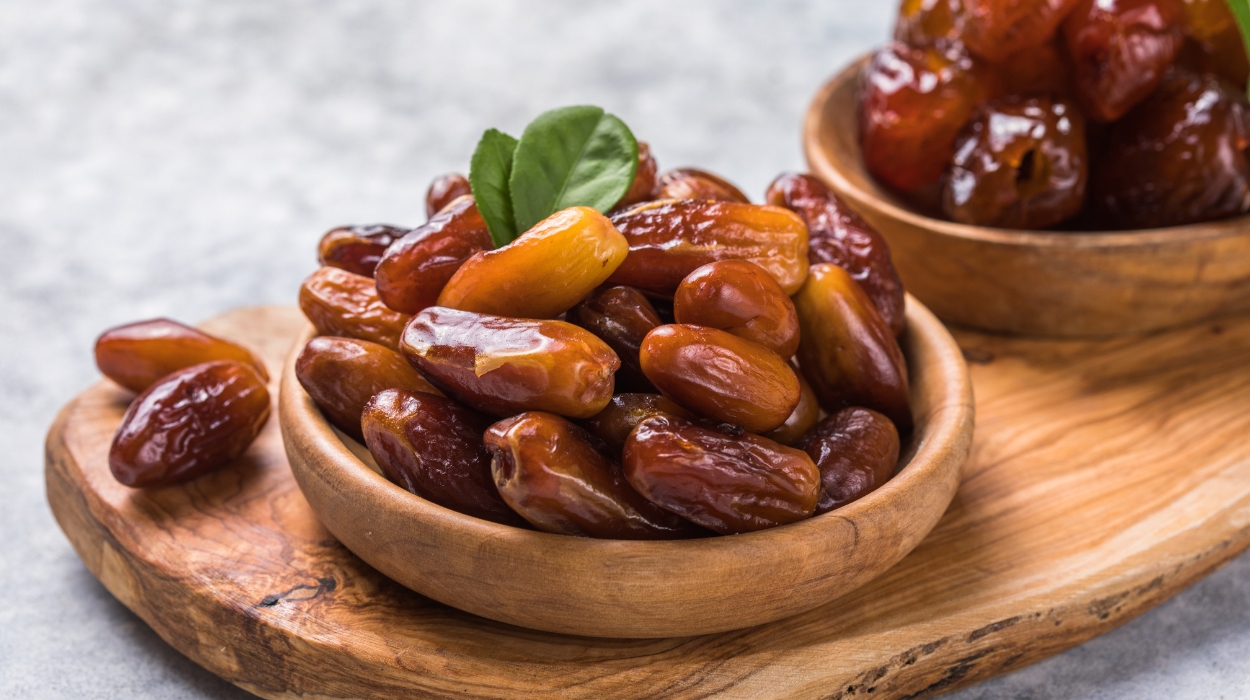 Expert's opinion
Expert's opinion
Expert's opinion
The article is a subjective view on this topic written by writers specializing in medical writing.
It may reflect on a personal journey surrounding struggles with an illness or medical condition, involve product comparisons, diet considerations, or other health-related opinions.
Although the view is entirely that of the writer, it is based on academic experiences and scientific research they have conducted; it is fact-checked by a team of degreed medical experts, and validated by sources attached to the article.
The numbers in parenthesis (1,2,3) will take you to clickable links to related scientific papers.
How To Lose Weight During Ramadan – 6 Safety Tips 2024

Ramadan is an important month of fasting for Muslims around the world. Those fasting during Ramadan abstain from food and drink between the hours of sunrise and sunset.
The Ramadan fast is a form of intermittent fasting, which has been gaining popularity[1] to lose weight. While this act of fasting allows followers of the Islam faith to focus on prayer and gratitude, for some, it can also be an excellent opportunity to shed extra weight.
Ramadan occurs once a year and lasts for one lunar month, in which millions of adult Muslims worldwide cycle between periods of eating and fasting. During Ramadan, people fasting consume two meals a day: before dawn (Suhoor) and after sunset (Iftar), which breaks the fast.
Since the Ramadan fast is a type of intermittent fasting, studies show the regime can help with weight loss[2].
How to Lose Weight During Ramadan
If you are fasting during Ramadan, taking in the following tips may help you shed some extra weight.
- Stay hydrated
- Eat a hearty, healthy Suhoor
- Break your fast slowly at Iftar
- Limit salt and sugar intake
- Limit processed foods
- Stay active
- Be consistent and patient
Practical Tips to Safely Lose Weight During Ramadan
Stay Hydrated
Studies show drinking water may promote weight loss regardless of diet and activity[3]. Drinking at least eight glasses of water a day prevents dehydration and helps control sugar cravings[3].
Ramadan occurs on slightly different dates each year, depending on the Islamic lunar calendar. During the hotter months, not drinking enough water may cause dehydration causing mental confusion or tiredness.
Try to avoid caffeinated beverages such as coffee and tea as they are diuretics, making the body lose even more water.
Eat a Hearty Yet Healthy Suhoor
Suhoor, the pre-dawn meal should be large and satisfying yet healthy to provide sufficient energy throughout a day of fasting.
Consume a balanced meal with complex carbohydrates like wholegrain bread instead of refined white bread and proteins such as cheese or eggs. This combination makes you feel full for longer and ensures a stable glucose level in the blood, so you don’t get too hungry during the day.
Do not be tempted to skip the pre-dawn meal entirely; otherwise, you will be over-hungry and end up overeating upon breaking fast after sunset.
Break Your Fast Slowly At Iftar

As hunger sets in during sunset, trying to eat a healthy Iftar meal may seem like a distant dream. Resist the temptation to overcompensate for missed meals by binge eating at the break of the fast.
Break your fast slowly by eating high-fiber dates containing naturally occurring sugars, which help to replenish energy lost during long hours of fasting. Dates are high in nutrition, being rich in magnesium and protein.
Taking your time, slowly move onto easily digestible foods such as soups and salads. Finally, moving onto an appropriately portioned main meal, balanced with complex carbs and proteins, avoiding fried or high-fat foods with huge caloric content.
Limit Salt and Sugar Intake
Studies show restricting dietary salt leads to rapid weight loss[4]. Avoid foods high in salt such as canned items, salted snacks, and spicy foods as this will increase your thirst during the day.
Ramadan offers many sweet delights and dishes, which can be challenging to resist.
Instead of losing weight, you can quickly gain weight from the processed sugar inside these sweet treats and sugary drinks.
When you eat sugary foods, the body breaks them down and metabolizes them quicker, making you feel hungry sooner. Try to eat only foods containing naturally occurring sugars such as fruits, dried fruits, and honey.
Limit Processed Foods
Processed foods are typically high in fat, salt, sugar, and calories. Studies show that processed, unhealthy foods such as fast food and packaged food increase weight gain[5] compared to consuming unprocessed single-ingredient foods.
Resist the temptation for ready-made meals to avoid weight gain and instead try to prepare and cook food using only fresh ingredients for a nutritious meal from all food groups, including grains, proteins, green vegetables, fresh fruits, lean meat, and healthy oils.
Stay Active

Although you may already be restricting calorie intake while fasting, do not be tempted to remain sedentary throughout Ramadan. Exercise on a daily routine helps maintain a healthy weight and lifestyle by increasing your energy expenditure, burning excess body fat, and maintaining muscle mass. Be sure to hydrate immediately after exercising.
Be Consistent and Patient
A month of Ramadan fasting can seem like a lifetime as this form of fasting alters eating patterns, and your body needs time to adjust and adapt – so be patient. To help with weight loss, be consistent with your diet plan, pay attention to portion sizes, and eat in moderation.
An Overview of Intermittent Fasting
Fasting is common in different faiths, including Islam, Christianity, and Judaism. It entails refraining from eating and drinking at different periods during specified times.
There is a difference between fasting and starvation; when you starve, you deprive your body by severely reducing calorific intake, possibly below the level to function correctly mentally and physically[1].
Instead, intermittent fasting involves cycles between periods of fasting and eating during the day or week. Instead of abstaining from particular foods, you refrain from eating or drinking at specific times.
A typical eating pattern in most cultures involves three main meals, often accompanied by snacks in between. Altering this ”normal” routine such as fasting of any form affects your energy balance.
Benefits of Intermittent Fasting
There are many benefits of intermittent fasting. Studies show that it can reduce weight, lower the prevalence of coronary artery disease and diabetes[2] and perhaps even increase longevity[6].
Other studies reveal that intermittent fasting may reduce inflammation[7], which drives many chronic diseases. Although more research is still needed, initial studies on animals suggest this fasting form may even help prevent cancer[8].
Fasting Affects Cells and Hormones
Intermittent fasting helps your body cells to self-repair[9] by digesting and removing old proteins no longer needed inside cells. Studies show that fasting alters gene function[10], which may protect against diseases such as Alzheimer’s and may also help you live longer.
When you fast, insulin levels reduce[11], making it easier to access stored body fat for weight loss. However, fasting increases your body’s human growth hormone[12], reducing fat and promoting muscle gain. Fasting also increases the release of norepinephrine[13] (noradrenaline) which is a fat-burning hormone helping you lose weight.
According to a 2000 study, these hormonal changes may increase your metabolic rate by up to 14%[13], which aids weight loss.
Weight Loss During Ramadan
When you reduce the number of meals per day, you automatically limit calorie intake. During Ramadan fast, calories are restricted to two meals, creating a theoretically negative energy balance, and favoring weight loss.
Studies show Ramadan fasting can effectively change body weight[14] compared to before fasting, with more men[14] than women losing weight. Studies also show more women experience hunger[15] earlier in the month, which then reduces as Ramadan progresses.
Another factor affecting weight loss appears to be ethnicity[16], with more weight loss seen among the Asian population than Africans and Europeans.
But despite some individuals who lose weight significantly during Ramadan, studies also show that most weight changes were relatively small[16]. They further conclude that even these small changes were reversed[16] shortly after Ramadan.
Conclusion
Ramadan fasting, like intermittent fasting, entails healthy eating and maintaining a calorie deficit – these are vital in losing weight. Consuming a well-balanced diet with all food groups, staying hydrated, and doing physical activity helps lose weight during Ramadan. Paying particular attention to portion sizes and trying to eat in moderation also helps.
Apart from weight loss, other benefits of intermittent fasting include lowering the prevalence of coronary artery disease and diabetes and possibly increasing longevity.
Weight loss during Ramadan fasting is variable with many individual variations. Fasting individuals’ energy intake and expenditure depend on social, cultural, and personal factors, which can cause weight to fluctuate. Also, although Ramadan provides an opportunity to lose weight initially structured, consistent lifestyle modifications are necessary to achieve lasting weight loss.
+ 16 sources
Health Canal avoids using tertiary references. We have strict sourcing guidelines and rely on peer-reviewed studies, academic researches from medical associations and institutions. To ensure the accuracy of articles in Health Canal, you can read more about the editorial process here
- Nader Lessan and Ali, T. (2019). Energy Metabolism and Intermittent Fasting: The Ramadan Perspective. [online] 11(5), pp.1192–1192. doi:https://doi.org/10.3390/nu11051192.
- Horne, B.D., Muhlestein, J.B. and Anderson, J.L. (2015). Health effects of intermittent fasting: hormesis or harm? A systematic review. [online] 102(2), pp.464–470. doi:https://doi.org/10.3945/ajcn.115.109553.
- Stookey, J.D., Constant, F., Popkin, B.M. and Gardner, C.D. (2008). Drinking Water Is Associated With Weight Loss in Overweight Dieting Women Independent of Diet and Activity. [online] 16(11), pp.2481–2488. doi:https://doi.org/10.1038/oby.2008.409.
- Mihara, Y., Kado, H., Yokota, I., Yayoi Shiotsu, Kazuhiro Sonomura, Tetsuro Kusaba, Hatta, T., Matoba, S. and Keiichi Tamagaki (2019). Rapid weight loss with dietary salt restriction in hospitalized patients with chronic kidney disease. [online] 9(1). doi:https://doi.org/10.1038/s41598-019-45341-6.
- Hall, K.D., Ayuketah, A., Brychta, R.J., Cai, H., Cassimatis, T.M., Chen, K.Y., Chung, S.T., Costa, E.T., Courville, A.B., Darcey, V.L., Fletcher, L.A., Forde, C.G., Gharib, A.M., Guo, J., Howard, R.J., Joseph, P.V., McGehee, S., Ouwerkerk, R., Klaudia Raisinger and Rozga, I. (2019). Ultra-Processed Diets Cause Excess Calorie Intake and Weight Gain: An Inpatient Randomized Controlled Trial of Ad Libitum Food Intake. [online] 30(1), pp.67-77.e3. doi:https://doi.org/10.1016/j.cmet.2019.05.008.
- Longo, V.D. and Mattson, M.P. (2014). Fasting: Molecular Mechanisms and Clinical Applications. [online] 19(2), pp.181–192. doi:https://doi.org/10.1016/j.cmet.2013.12.008.
- Faris, E., Safia Kacimi, Alkurd, R.A., Fararjeh, M., Yasser Bustanji, Mohammad Ali Mohammad and Salem, M. (2012). Intermittent fasting during Ramadan attenuates proinflammatory cytokines and immune cells in healthy subjects. [online] 32(12), pp.947–955. doi:https://doi.org/10.1016/j.nutres.2012.06.021.
- Lee, C., Lizzia Raffaghello, Brandhorst, S., Safdie, F.M., Bianchi, G., Martin-Montalvo, A., Pistoia, V., Wei, M., Hwang, S., Merlino, A., Emionite, L., Rafael de Cabo and Longo, V.D. (2012). Fasting Cycles Retard Growth of Tumors and Sensitize a Range of Cancer Cell Types to Chemotherapy. [online] 4(124). doi:https://doi.org/10.1126/scitranslmed.3003293.
- Mehrdad Alirezaei, Kemball, C.C., Flynn, C.T., Wood, M.R., J. Lindsay Whitton and Kiosses, W.B. (2010). Short-term fasting induces profound neuronal autophagy. [online] 6(6), pp.702–710. doi:https://doi.org/10.4161/auto.6.6.12376.
- Martin, B., Mattson, M.P. and Maudsley, S. (2006). Caloric restriction and intermittent fasting: Two potential diets for successful brain aging. [online] 5(3), pp.332–353. doi:https://doi.org/10.1016/j.arr.2006.04.002.
- Heilbronn, L.K., Smith, S.M., Martin, C.K., Anton, S.D. and Ravussin, E. (2005). Alternate-day fasting in nonobese subjects: effects on body weight, body composition, and energy metabolism1,2. [online] 81(1), pp.69–73. doi:https://doi.org/10.1093/ajcn/81.1.69.
- Hartman, M.L., Veldhuis, J.D., Johnson, M.K., Lee, M.M., Alberti, M., Samojlik, E. and Thorner, M.O. (1992). Augmented growth hormone (GH) secretory burst frequency and amplitude mediate enhanced GH secretion during a two-day fast in normal men. [online] doi:https://doi.org/10.1210/jcem.74.4.1548337.
- Zauner, C., Schneeweiss, B., Kranz, A., Madl, C., Klaus Ratheiser, Kramer, L., Roth, E., Schneider, B. and Lenz, K. (2000). Resting energy expenditure in short-term starvation is increased as a result of an increase in serum norepinephrine,. [online] 71(6), pp.1511–1515. doi:https://doi.org/10.1093/ajcn/71.6.1511.
- Seval Kul, Ekrem Savaş, Zeynel Abidin Öztürk and Gülendam Karadağ (2013). Does Ramadan Fasting Alter Body Weight and Blood Lipids and Fasting Blood Glucose in a Healthy Population? A Meta-analysis. [online] 53(3), pp.929–942. doi:https://doi.org/10.1007/s10943-013-9687-0.
- Finch, G., Day, J.C., Razak, Welch, D.A. and Rogers, P. (1998). Appetite Changes Under Free-living Conditions During Ramadan Fasting. [online] 31(2), pp.159–170. doi:https://doi.org/10.1006/appe.1998.0164.
- Behnam Sadeghirad, Shahrzad Motaghipisheh, Fariba Kolahdooz, Mohammad Javad Zahedi and Ali Akbar Haghdoost (2012). Islamic fasting and weight loss: a systematic review and meta-analysis. [online] 17(02), pp.396–406. doi:https://doi.org/10.1017/s1368980012005046.



